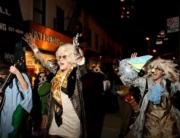Ai Weiwei: The Fake Case overlaps and then follows-up Alison Klayman’s Ai Weiwei: Never Sorry (2012). But it stands alone as an intimate portrait of a stubborn artist inspired to turn government harassment into the art he just can’t stop creating.
As today’s most famous Chinese artist, the world media captured his release in June 2011 after 81 days of solitary detention. He looked wan and turned down interviews. While staying within the arbitrary rules of Ai Weiwei’s year-long parole, Danish filmmaker Andreas Johnsen hangs out with him throughout the changing seasons so that we can see his personal recuperation and artistic recovery, with occasional conversational Q & A about his politics and hopes.
Ai Weiwei first catches up with his family, playing with his toddler son (we only see the child’s mother, not his wife and business manager who stuck with him through his trumped up trial), reassuring him that the guard dogs are really friendly, turning it into a teachable moment: “We are not afraid.” His 80-year-old mother tartly compares what happened to him to what his intellectual father survived: “If this was 1957 you’d be dead.” These family scenes reinforce why he wants to stay in the country, even if his passport were returned.
Practically under house arrest, he is mostly restricted to his large studio, with a walled garden and pool, and his apartment, which tantalizingly overlooks the U.S. embassy. He looks tired and tense from sleepless nights that lead him to lose his concentration and doze off unexpectedly. He calls a security agent to let him know where he’s going, explaining “If I don’t call, he’ll get in trouble.” When he goes out, he plays “I Spy” with the agents following him, shrugging that they are just “doing their job.” Until one beats up one of his fans videotaping him. Then he goes out and berates and pushes the agent for breaking the rules of this game of politics.
Fan support helps him recover from his psychological and emotional weakness. He beams at the nude photograph he posed with such fans that the government claims is pornography. While the earlier film showed his supporters flying bills over his wall to help pay off his $2 million fine, volunteers now gather to count and tag the big piles of donations that have come in over the transom and in the mail, at least $1.5 million.
He half-seriously discusses with a collector how he can monetize past art like his zodiac images, which he used to do through what he named “The Fake Company.” The film’s title is a play on his Kafka-esque legal situation, as he describes it with humor-laced anger over what he calls his kidnapping and the extra-legal charges: “It’s a fake case about a Fake Company. But the Fake Company is a real company and the fake case is a real case, but it’s fake, it’s fabricated.”
He starts turning the whole experience into art. Taunting the government that they are secretive, let alone immoral, he doesn’t hide from the constant government surveillance. He sets up 24-hour-a-day video cameras in his bedroom, so we see how he restlessly paces at night from his frightening dreams, which he draws on for inspiration. When he’s blocked from uploading his images on Twitter, he switches to sending these ironic selfies via other social media. As a powerful form of catharsis, he works with a sculptor to create a pointed self-portrait, six scale models of every detail of his jail cell, complete with a miniature sink, toilet, and guards. Titled S.A.C.R.E.D., it’s packed up for installation at the 2013 Venice Biennale, and is now on exhibit at the Brooklyn Museum as part of the Ai Weiwei: According to What? retrospective.
This documentary frequently veers more to an extended 60 Minutes profile than the insightful This Is Not a Film (2012), which reveals the personal and artistic impact of censorship in Iran on two frustrated artists, Jafar Panahi and Mojtaba Mirtahmasb. Nor is his treatment (thankfully) as brutal or final as some authoritarian regimes have employed, and through it all he has retained his Buddha-esque profile. But even as the film demonstrates the power of government control to inflict disruptive stress, the power of art transforms repression into optimism, such that Ai Weiwei can still insist: “We will have change.”






Leave A Comment